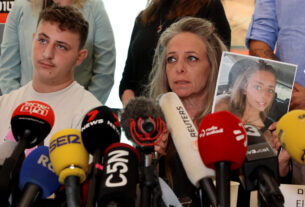((JEWISH REVIEW)) — Wade Melnick understood that something was truly amiss when he saw a car driving through the haredi Orthodox Israeli town where he was spending Shabbat.
A rabbinical student at the Jewish Theological Seminary of America, a Conservative rabbinical school, Melnick and his wife had traveled from Jerusalem to Elad, an Orthodox town about 45 minutes northwest, to celebrate the Simchat Torah and Shemini Atzeret holiday. Their host returned from synagogue alarmed that some of the Orthodox men there were carrying phones and checking their messages — an act prohibited on the holiday except when needed to save a life.
Then the car drove down the town’s streets — another practice prohibited on Shabbat and Jewish festivals. It carried a local leader who broadcast a message instructing everyone to stay indoors. Soon afterward, sirens started blaring. At one point, the ground shook when a rocket landed a few kilometers away.
It wasn’t until after the sun set that Melnick, his wife and their host understood the scope of the crisis: Hamas had invaded Israel, killing hundreds, wounding thousands and taking a then-unknown number of people hostage, including women and children. A massive military mobilization was underway.
“We were scared,” Melnick recalled on Sunday. “It was scary — and we’re thinking about making plans to come home.”
Melnick is one of dozens of American rabbinical students in Israel for the school year, which is only just getting underway. Some, like Melnick, are looking to leave, or to send their family members home to safety. Others are stranded abroad, unsure of where they will learn this semester. And still others say they are undeterred and intend to carry on with their classes — pledging to volunteer to support the Israeli crisis response and war effort in addition to their study.
Noa Rubin, another student at JTS, which is located in New York City, spent the summer in a chaplaincy training program at a Bronx hospital. So when she heard that Shaare Zedek hospital in Jerusalem was looking for people with mental health care training to work with people traumatized by the attack, she offered herself up.
“I’m not a professional professional,” she said. “But I thought I had some of the skills, and I’m trying to do whatever I can. It keeps me productive to feel as helpful as I can be.”
So far, Rubin hasn’t gotten any requests for counseling. Instead, with the start of classes delayed until Oct. 22, she’s turned her attention to raising funds to buy supplies and protective gear for soldiers who are heading into what could be a long and brutal war. She said she doesn’t plan to leave Israel.
“Unless my classes are exclusively online or Israel told me it was a good idea to leave, my intention is to stick around here,” she said. “I think it’s an important show of solidarity.”
Shayna Dollinger, a second-year student at Hebrew Union College in Los Angeles, a Reform seminary, is not able to decide whether or not to attend classes in Jerusalem. She was on vacation in Vienna when Hamas attacked, and her flight back to Israel was canceled.
So she flew to Munich and then to Porto, Portugal, where she spent the night before boarding a bus to Vigo, Spain, a coastal city where she had friends. She’s currently booked to return to California on Thursday but said she would finalize her plans on Wednesday when HUC updates students about planning for classes.
Two other students are stranded abroad, Dollinger said, while 20 are still in Israel — though messages on a class WhatsApp group suggested that not all would remain there. “A third would like to leave and are actively trying to leave,” she said. “The rest either think it’s safer to shelter in place or they want to stay to be part of the effort.”
Dollinger said she had been impressed by HUC’s planning for emergencies. The school had created a group chat for use in emergencies only — it had been used once before, after a shooting attack in Tel Aviv in August — and quickly asked the students to check in there.
“The communication has been amazing from the minute it started,” she said, adding that she thought the school was being “very accommodating” of students like her who expected to attend courses via Zoom instead of in person.
Jacob Kaplan-Lipkin, a student at JTS, said he had been surprised by how unprepared he felt for the crisis. When the sirens went off on Saturday morning, his first thought was that there was a fire alarm, or that Israel was testing an alert system the way the U.S. government did last week. And when he realized that it wasn’t a drill, he wasn’t sure what to do.
“Our building had a shelter, but no one had really taken seriously the possibility that we would need to use it anytime soon,” he said of his Jerusalem apartment building. “We didn’t really know where it was. We ran down the stairs, and we saw that there was a shelter but it was locked and no one could get in. … So we huddled in the corridor. It was my first time meeting many of my neighbors.”
Some residents of the building in the Baka neighborhood used their phones on Shabbat and holidays, and revealed the grim details of the attack as they became available. One resident was an older woman who said she was having flashbacks to the start of the Yom Kippur War, exactly 50 years earlier, Kaplan-Lipkin recalled. Then, as now, Israel was struck by surprise during a holiday.
“Everyone was absolutely stunned and said they didn’t think this was possible,” he said. “We were hearing from all these residents that this was brand new to them. It was an extraordinary contrast from the night before when we had been dancing in the streets with the Torah.”
On Sunday, Kaplan-Lipkin said, he joined classmates in dropping off toiletries and other supplies for soldiers and people displaced from the border towns that had been attacked.
“I felt viscerally the discomfort of sitting around while I was watching people leave in uniform,” he said. “I wish I had the ability to do much more, but there is an overwhelming feeling of doing what we can and of wanting to stick together.”
As a Hebrew College student who is also pursuing a Jewish day school teaching certificate through Jerusalem’s Pardes Institute, Willemina Davidson is in the unusual position of being in their second year in Israel. They said they had opened their apartment to classmates who didn’t have safe rooms in their own homes and was looking for other ways to be helpful — all while their friends and family in the Midwest keep a watchful eye on them.
“My family and friends in the U.S. are just concerned for me and for other people they know,” Davidson said. “They also know that I am less likely to stay still, so they’re hoping I will be smart about this.”
Like many U.S. rabbinical students, Davidson has become involved in efforts to build bridges with Palestinians in the West Bank. They said they expected that even though the attack represented a major challenge, they would still seek to protect Palestinian farmers whose land and harvests sometimes come under attack from Jewish settlers.
“Many of us still plan on helping with the olive harvest. I think an extra level of precaution will need to be taken,” Davidson said. “It’s a volatile time, but people will continue to do their solidarity work and help each other.”
For Melnick and his wife, Devorah Mehlman, it’s hard to contemplate adding to the aid effort given the uncertainty about their own futures. They’d like to leave the country, but flights are hard to come by. And even if they can get on one, it’s not clear where they could go — they rented out their New York City apartment for the school year. They could stay with parents in Georgia, but it wasn’t clear on Sunday whether they could attend classes on Zoom moving forward.
“I’m not someone who was very afraid to come. I was really looking forward to coming and staying here,” Melnick said. “But no year in Israel is worth this much heartache.”
He added, “It sounds like it’s going to get worse before it gets better. And we just don’t want to be here for it.”




